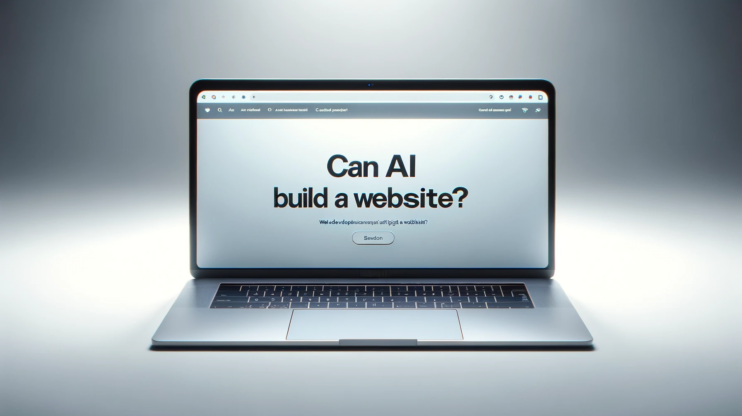
By Admin On 16-05-2024 at 10:13 am
AI For Website Building: Tools, Tips, and Trends for 2024
AI has also revolutionized Search Engine Optimization (SEO) by analyzing vast data to provide optimization recommendations, making SEO more accessible. Additionally, AI enhances hosting and website performance by managing server loads, detecting security threats, and optimizing content delivery for speed and reliability.
These advancements simplify the technical aspects of website building and enhance the creative process, enabling developers and designers to innovate. The evolution from basic AI tools to comprehensive development solutions highlights AI's growing importance in creating dynamic, efficient, and personalized web experiences.
The Rise of AI Website Builders
AI website builders offer numerous benefits to a wide range of users, from novices to professionals:
- Efficiency: AI accelerates website creation by automating tasks like layout design, content generation, and SEO optimization, allowing rapid deployment.
- Cost-Effectiveness: Reducing the need for extensive human labor in the initial development stages significantly lowers website creation and maintenance costs.
- Accessibility: Designed with user-friendliness in mind, AI website builders make it easy for users without coding expertise to design, build, and manage professional-quality websites.
Top AI Website Builders: A Comparative Overview
10Web 10Web leverages AI to generate WordPress-ready templates from URLs, ideal for users migrating or replicating websites on the WordPress platform. It offers deep customization with its Elementor-based editor.
Wix Wix combines practicality with extensive features, appealing to both novices and experienced users. Its Artificial Design Intelligence (ADI) system creates custom website templates based on user input, simplifying the website-building process.
Hostinger Known for its logo and copy generation capabilities, Hostinger provides an affordable solution with unique AI features. Its AI website generator, AI Writer, AI Logo Maker, and AI Heatmap are valuable for branding and content-focused users.
Shopify Shopify's AI-powered platform simplifies e-commerce website creation with comprehensive solutions, including inventory management, payment processing, and marketing tools, making it ideal for online merchants.
Jimdo Jimdo's AI, Dolphin, assists in quickly generating functional websites that can be customized through its standard site editor. It appeals to users seeking simplicity and efficiency.
GoDaddy Airo GoDaddy Airo is designed for users of all skill levels, guiding them through website creation with AI-driven design and content suggestions that align with their goals.
TeleportHQ TeleportHQ uses ChatGPT to offer an AI website and UI generator for quick prototyping and optimization, making it suitable for developers transitioning from idea to prototype.
Appy Pie Appy Pie extends AI utility by enabling the conversion of AI-powered websites into mobile apps, appealing to businesses aiming to enhance their mobile presence despite lighter design capabilities compared to other platforms.
Each AI website builder offers unique features and benefits, catering to diverse needs. Whether you're launching an e-commerce platform, showcasing a portfolio, or seeking efficient prototyping, AI website builders streamline the process.
Beyond constructing website elements, AI tools refine user interfaces, craft brand identities with AI-generated logos, and complement foundational work done by AI website builders.
AI-Powered Design and Graphic Creation Tools
In website development, aesthetic appeal is crucial for engaging users. AI has greatly enhanced designers' and developers' abilities to create visually stunning websites by automating and optimizing graphic design and layout creation.
AI for Images
Tools like DALL-E, Craiyon, and Midjourney generate images from text prompts, offering unique capabilities in terms of ease of use, customization, and licensing. These tools cater to various needs, from website visuals to e-commerce products, enhancing digital content with creativity and precision.
AI for UI/UX Design
AI technologies like Adobe Sensei transform design by automating mundane tasks, offering insights into user behavior, and predicting future design trends. This streamlines the creative workflow and ensures final designs are optimized for user engagement and satisfaction. AI's impact on UI/UX design allows designers to focus on innovation while AI handles analysis and optimization.
Logo and Branding with AI
AI-powered tools like Brandmark.io and Canva's logo maker have revolutionized logo creation and branding. These platforms enable anyone to design professional-quality logos tailored to their brand's identity by analyzing key elements such as name, industry, and color preferences. They also offer comprehensive brand kits, ensuring consistency across marketing materials, democratizing access to high-quality branding.
AI Writers for Web Content
For content strategy, tools like Grammarly, Rytr, and Jasper AI provide robust solutions. Grammarly offers real-time grammar, punctuation, and style suggestions, beneficial for crafting flawless content. Jasper AI provides over 52 writing templates for various use cases, helping businesses meet content demands quickly. Copy.ai aids in generating diverse content quickly and efficiently, supporting team collaboration and integrating with CMS platforms.
Content Strategy and SEO
AI tools are reshaping content strategy and SEO optimization. MarketMuse focuses on AI-driven content research and optimization, offering content briefs and first draft generation. It helps create high-quality, SEO-optimized content that resonates with the target audience.
Integrating AI into content creation and management tools offers unprecedented efficiency and quality in digital marketing efforts. By leveraging these AI tools, businesses and content creators can enhance productivity, reach wider audiences, and achieve content marketing goals with greater precision and less effort.
Enhancing User Experience with AI
AI's dynamic capabilities significantly enhance user experience on websites by integrating intelligent systems that interact, learn, and adapt. A key area where AI impacts user experience is through chatbots and customer support.
Chatbots and Customer Support
AI-powered chatbots like Tidio and Netomi are transforming online customer support by automating responses and providing personalized assistance. Tidio automates customer inquiries without code, offering an intuitive interface for crafting conversation flows and integrating with various platforms. Netomi uses advanced Natural Language Understanding to resolve queries across email, chat, messaging, and voice platforms, improving over time through reinforcement learning.
AI for Website Building and Code Generation
AI-driven code assistants streamline design and content creation and enhance coding. GitHub Copilot, powered by OpenAI’s Codex, serves as a virtual pair programmer, suggesting code snippets and entire functions in real-time within the code editor. It helps developers by reducing time spent on routine coding tasks and debugging, making coding more efficient and accessible.
AI for Website Prototyping
AI tools like Uizard streamline the prototyping process by transforming hand-drawn sketches into digital design prototypes. Uizard’s AI interprets sketches and converts them into functional and visually appealing prototypes, accelerating the transition from idea to prototype and democratizing design for those without extensive digital design experience.
The Outlook for AI-Powered Website Building
The emergence of AI tools for website building heralds a new era of efficiency, creativity, and personalized user experiences. These tools simplify tasks that once required extensive manual effort and open new avenues for innovation, allowing for the creation of web experiences that were previously unimaginable. As AI's role in web development grows, web professionals can enhance their projects, benefiting clients, companies, and end-users who experience increasingly dynamic and interactive web environments.

Author
Share on:
Related posts

16-05-2024
What Is Predictive AI, and How Does It Work?
